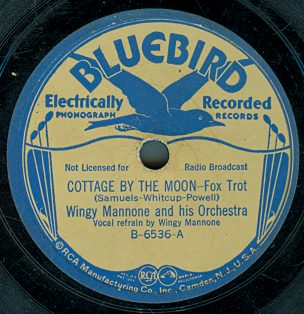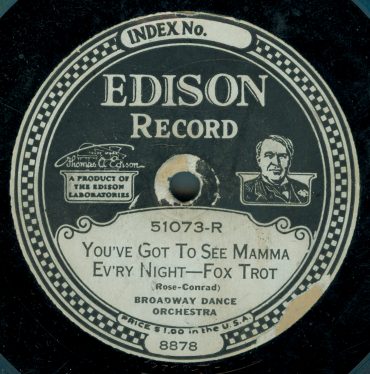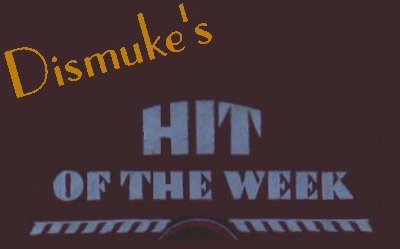
Cottage
By The Moon
Wingy Manone And His Orchestra
Wingy Manone, vocal
1936
(Bluebird B 6536 A)
It
Can Happen To You
Wingy Manone And His Orchestra
Wingy Manone, vocal
1936
(Bluebird B 6536 B)
Wingy Manone was a trumpet
player from New Orleans who got his start performing on Mississippi River
steamboats. When he was a child, Manone lost his right arm in a streetcar
accident. He was nevertheless able to use his artificial arm so convincingly
that many of his fans were not aware of his handicap. By the
1930s, Manone was as well known for his jive vocals as he was for
his New Orleans style trumpet playing. The peak of his
popularity was in the late 1930s and early 1940s.
- Dismuke
If you have questions or
comments about the music or would simply enjoy interacting with friendly
people who share your interest in it, join in the conversation on Dismuke's
Message Board.
EXTRA
This section will present
78 rpm recordings that do not fall within the range of the vintage pop
and jazz fare that I usually present. Here I will feature
recordings from a wide variety of eras, musical genres and nationalities
as well as occasional spoken word recordings.

Youíve
Got To See Mama Evíry Night
Broadway Dance Orchestra
1923
(Edison 51073 R mx 8878)
Everything
Is KO in KY
Kaplanís Melodists
1923
(Edison 51073 L mx 8837)
These selections are from an old
Edison Diamond Disc record. During the first two decades of the 20th
century, the patents for the lateral (or zig zag) recording grooves found
on conventional 78 rpm records were held exclusively in the United States
by Victor and Columbia. Until 1919, other companies wanting to compete
in the United States record market had to use the vertical (or "hill and
dale") groove process that had previously been used on cylinder records.
Thomas Edison preferred cylinder
records on grounds that they were a superior audio product as they did
not have the sound degradation that occurs on disc records as the grooves
get closer to the center of the record. However, because
of the disc record's ability to feature a second side of recorded content
and their more convenient storage capabilities, by 1912 the marketplace
had rejected cylinder records in favor of the disc. Edison's answer
was the Diamond Disc. The records were a quarter inch thick and weighed
a full pound and featured an ultra quiet surface laminated over a wood
pulp core. The records could only be played on Edison
machines. Rather than the steel needles used for the playback of
conventional records, Edison's machines were equipped with a special, permanent
diamond stylus.
Prior to the advent of electrical
recording, Edison's Diamond Discs were usually superior to their competition
in terms of audio fidelity. Thomas Edison's priority
and focus on technological quality over providing the sort of music and
artists the public was interested in hampered the company's commercial
success. In fact, Edison insisted on personally auditioning
every recording issued by the company - despite the fact that he was almost
deaf and that his 19th century musical tastes were out of line with what
modern audiences wanted.
After the lateral recording patents
expired in 1919, every other label in the United States besides Edison
using vertical recording grooves switched over to the more popular process.
By the early 1920s, Edison records were increasingly regarded by the record
buying public as being hopelessly old fashioned and the company entered
a long decline that ended when the stock market crash of 1929 forced it
out of business. In the final months of operations, Thomas Edison
finally authorized the release of conventional, lateral grooved Edision
records - but it was too little too late.
Both of these recordings were made
by Edison studio orchestras. Thomas Edison disliked jazz - but there
are definitely examples of it on "You've Got To See Mama Ev'ry Night."
Kaplan's Melodists was named after Dave Kaplin who was a pianist, arranger
and music director for Edison's record operations.
- Dismuke
If you have questions or
comments about the music or would simply enjoy interacting with friendly
people who share your interest in it, join in the conversation on Dismuke's
Message Board.


